Two Women Human Rights Defenders seek public apology and millions of baht in compensation for the damages caused by Pulony.blogspot.com, a website funded by the public, taxpayer money
[Bangkok] – On 4 November 2020, Angkhana Neelapaijit, former National Human Rights Commissioner of Thailand, and Anchana Heemmina, former NHRC subcommittee member on the Southern Border Provinces (SBPs), submitted a complaint to the Bangkok Civil Court against the Office of the Prime Minister in charge of Internal Security Operations Command (ISOC) and the Royal Thai Army. The two women Human Rights Defenders (W/HRDs) accused the Thai authorities of arranging an online smear campaign against W/HRDs and spreading disinformation via Pulony.blogspot.com.
The possibility to file the case with the Court arose after the House’s debate on the Draft Budget Act early this year. During this session, details on the ISOC’s operations in the SBP were revealed through the budget, bringing to light the fact that agencies under ISOC have been supporting online information operations.
The documents also provide evidence that a smear campaign was launched against Angkhana Neelapaijit. Even though her name was not directly mentioned in the ISOC materials, her photo has been used on the website alongside misleading and false headlines that are meant to sow hatred toward her and other human rights activists, causing misunderstanding among the public.
Sanya Eadchongdee, one of the lawyers assisting the two W/HRDs in their case, says it is not right that ISOC operations are being used to seed confusion, especially if they are funded with Thai taxpayers’ money: “In the past three fiscal years, the ISOC has revealed that it has launched 140 campaigns against its opposing or dissenting parties. This is not only bad, but it should have never happened. The Parliament should not support operations to attack the people and create disunity,” explained Sanmya.
The Office of the Prime Minister and the Royal Thai Army are the first and second defendants in the case, respectively, since Thailand’s Prime Minister acts as Director of ISOC. The Commander in Chief and the Commander of Army Area Region 4 are supervisors of the Information Operation. The case questions if, as commanding officers, they made any efforts to review the agencies’ operations that fall under their command. The failure to do so would constitute negligence, as it is their responsibility to ensure that those under their command are acting in compliance with the law. If they are found guilty, they are obliged to offer fair remedies and compensation to the victims.
“I hope that this case will help to set a precedent for others who are trying to make the State accountable for unduly exercise of its power and wrongfully spreading disinformation and discrediting legitimate HRD work,” said Surachai Trongngam, another lawyer in the case. Angkhana and Anchana asked three and two million baht respectively for the damages related to the negative impact on their reputation, dignity, and mental trauma that were resultant of the gross and dehumanizing smear campaign.
Angkhana Neelapaijit has been a target of the Information Operation (IO) since she started working on human rights issues. The IO campaign against her spiked in the wake of the 2014 military coup, and even more so when, as National Human Rights Commissioner, she was working on civil, political, and human rights in the Southern Border Provinces (SBPs). Every time she denounced human rights violations committed by security forces, online smear campaigns would target her with fake news, dehumanization, and hate speech, taking a mental toll on her. Even though she reported three cases to the Technology Crime Suppression Division (TCSD) and police stations, investigations remained inconclusive.
“The State must protect every citizen from any human rights violation, including smear or hate campaigns,” Angkhana said. “This kind of campaign clearly violates human rights, and if the State has failed to stop them, it should constitute an act of negligence – No matter if the State was somehow implicated or not.“
Former member of the National Human Rights Commission of Thailand (NHRCT) subcommittee on the SPBs and Chairperson of Duay Jai Group, Anchana Heemmina, says she also had to endure the brutality of online smear campaigns after publishing the report on alleged torture in the SBPs. She was accused of being a supporter of the insurgency movement and of being hostile to the State. She and her family have also experienced harassment.

former National Human Rights Commissioner of Thailand
“We are subject to constant surveillance. They keep commenting on Facebook posts with offensive and denigrating words that make me anguish. I started to get annoyed by their mockery. Instead of trying to understand what we do, some people tend to believe in manufactured content produced to attack us on social media. They use the images and the false claims to berate our work,” said Anchana.
Pranom Somwong, Protection International’s Representative in Thailand, said that Thailand, a State party to the UN General Assembly, has universally adopted the Declaration on Human Rights Defenders and is obliged to comply. Both plaintiffs are Women Human Rights Defenders and, as such, they deserve the protection pursuant to the Declaration on Human Rights Defenders, including remedies and compensation for the violation of their rights by the State.
The UN Special Rapporteur on Torture released a report on 14 February 2020, suggesting that cyber-bullying is tantamount to psychological torture, and it is not dissimilar to physical torture since it constitutes a systematic, inhuman, and degrading treatment of the survivors in the public sphere. “In the online world, the perpetrators often come across as anonymous,” Pranom further reveals. “Their anonymity can make their victims feel powerless, vulnerable, stressed, and anxious for a long period of time. This causes grave mental suffering and it is sometimes as severe as torture and other cruel, inhuman, or degrading treatment or punishment.”


